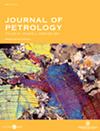揭示印度塞瓦图尔碳酸盐岩 Ba-Sr-REE 成矿过程中的岩浆-碳热过程
IF 3.5
2区 地球科学
Q1 GEOCHEMISTRY & GEOPHYSICS
引用次数: 0
摘要
新新生代塞瓦图尔碳酸盐岩群(印度)由方解石碳酸盐岩、贫硅酸盐和富硅酸盐(带状和蓝色)白云石碳酸盐岩组成。方解石和铁白云石的微量元素组成表明,它们大多具有岩浆特征。白云石碳酸盐岩比方解石碳酸盐岩多,而且塞瓦图尔没有与之基因相关的硅酸盐岩套,这表明白云石母岩浆是由地幔直接熔化而成的。无论塞瓦图尔碳酸盐岩的岩浆特征如何,它们都蕴藏着大量的Ba-Sr-RE矿物,这些矿物是在${mathrm{F}}^{-}$、${mathrm{CO}}_3^{2-}$、${mathrm{PO}}_4^{3-}$和${mathrm{SO}}_4^{2-}$的不同活性下,从正岩浆阶段到碳热阶段形成的。正长岩阶段开始于方解石碳酸盐岩的结晶,在富含锶镁的方解石(Cal-II)基质中含有异长晶透辉石、反长晶含Y方解石(Cal-I)以及原生辉石、磷灰石和富钛铁矿。磷灰石、碳酸盐岩和堇青石(Ce)的分馏,以及后期岩浆阶段镁、铁、鈉和萤石的富集,形成了白云石碳酸盐岩。在同一阶段,白云碳酸盐岩中的榍石分解为糯塞石、碳酸钡和锶铁矿,壁岩同化作用极小。在晚期岩浆阶段,异晶闪长岩与原生岩浆之间的相互作用导致方解石碳酸盐岩中形成了埃吉林岩和辉绿岩。同样,演化岩浆长期同化褐辉石,在条带状和蓝色碳酸盐岩中形成了菱镁菱镁矿和菱镁菱镁矿。在碳热阶段,${mathrm{PO}}_4^{3-}、{\mathrm{SO}}_4^{2-}$和H2O的活性不断增加,破坏了前驱碳橄榄石和堇青石(Ce)的稳定性、从而在白云碳酸盐岩中形成了由同步闪长岩-(Ce)、安长岩-(Ce)、大青山岩、羟基白云石-(Ce)、铁闪长岩-(Ce)、独居石-(Ce)和重晶石组成的集合体。在带状碳酸盐岩中,碳热阶段的特征是铁闪长岩、透闪石-阳起石和辉绿岩结晶。碳热液的进一步污染和分化导致蓝色碳酸盐岩中的石英和白云石结晶。蓝碳酸盐岩和霞石中的辉绿辉石化是碳热流体中钾富集后期的结果。本文章由计算机程序翻译,如有差异,请以英文原文为准。
Unraveling the Magmatic-to-Carbothermal Processes in the Ba-Sr-REE Mineralization of the Sevattur Carbonatites, India
The Neoproterozoic Sevattur carbonatite complex (India) consists of calcite carbonatite, silicate-poor- and silicate-rich (banded and blue) dolomite carbonatite. The trace element composition of the calcite and ferroan dolomite shows that most of them have magmatic characteristics. The predominance of dolomite carbonatite over calcite carbonatite and the absence of a genetically related silicate suite at Sevattur suggest a dolomitic parental magma derived by the direct melting of the mantle. Regardless of the prevalent magmatic character of the Sevattur carbonatites they host a plethora of Ba-Sr-REE minerals formed throughout the orthomagmatic-to-carbothermal stages under varying activities of ${\mathrm{F}}^{-}$,${\mathrm{CO}}_3^{2-}$, ${\mathrm{PO}}_4^{3-}$and ${\mathrm{SO}}_4^{2-}$. The orthomagmatic stage begins with the crystallization of calcite carbonatite containing xenocrystic diopside, antecrystic Y-bearing calcite (Cal-I), and primary benstonite, apatite, and richterite in a Sr-Mg-rich calcite (Cal-II) matrix. Fractionation of apatite, carbocernaite, and cordylite-(Ce) together with the enrichment of Mg, Fe, Na, and F in late-magmatic stages, forms the dolomite carbonatite. The decomposition of benstonite to norsethite, Ba-Ca carbonate, and strontianite occurs within dolomite carbonatite at the same stage with minimal wall-rock assimilation. Interaction between the xenocrystal clinopyroxenite and the primary magma during late-magmatic stages has resulted in the formation of aegirine and phlogopite in calcite carbonatite. Similarly, the prolonged assimilation of clinopyroxenite by the evolving magma leads to the formation of magnesio-riebeckite and magnesio-arfvedsonite within the banded- and blue carbonatites. The increasing activities of ${\mathrm{PO}}_4^{3-},{\mathrm{SO}}_4^{2-}$and H2O during the carbothermal stage, destabilizes precursor carbocernaite and cordylite-(Ce), resulting in an assemblage consisting of synchysite-(Ce), ancylite-(Ce), daqingshanite, hydroxylbastnäsite-(Ce), ferriallanite-(Ce), monazite-(Ce), and baryte in dolomite carbonatite. In the banded carbonatite, the carbothermal stage is characterized by ferri-winchite, tremolite-actinolite, and phlogopite crystallization. Further contamination and differentiation of the carbothermal fluid have resulted in the crystallization of quartz and albite in blue carbonatite. Phlogopitization within the blue carbonatite and clinopyroxenite results from late K enrichment in the carbothermal fluids.
求助全文
通过发布文献求助,成功后即可免费获取论文全文。
去求助
来源期刊

Journal of Petrology
地学-地球化学与地球物理
CiteScore
6.90
自引率
12.80%
发文量
117
审稿时长
12 months
期刊介绍:
The Journal of Petrology provides an international forum for the publication of high quality research in the broad field of igneous and metamorphic petrology and petrogenesis. Papers published cover a vast range of topics in areas such as major element, trace element and isotope geochemistry and geochronology applied to petrogenesis; experimental petrology; processes of magma generation, differentiation and emplacement; quantitative studies of rock-forming minerals and their paragenesis; regional studies of igneous and meta morphic rocks which contribute to the solution of fundamental petrological problems; theoretical modelling of petrogenetic processes.
 求助内容:
求助内容: 应助结果提醒方式:
应助结果提醒方式:


